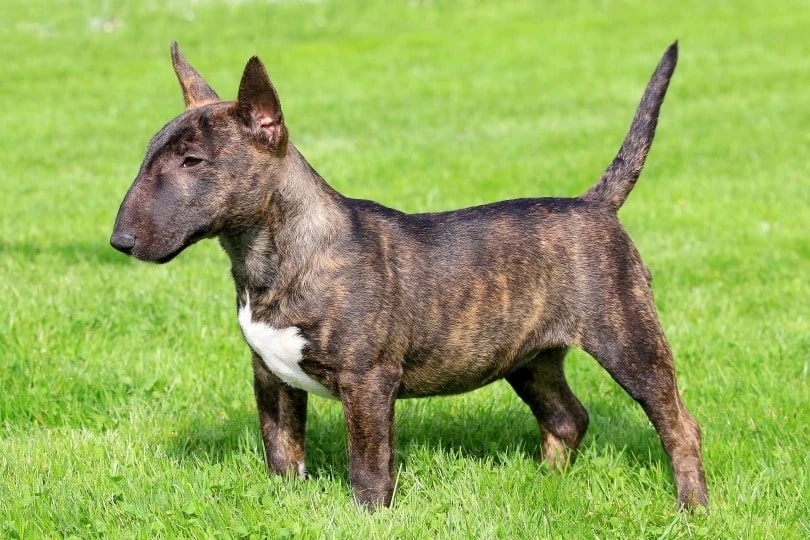The Miniature English Bull Terrier, often simply called the Mini Bull Terrier, is a smaller version of the standard Bull Terrier, known for its distinct egg-shaped head, muscular build, and vivacious personality.
Despite its diminutive size, this breed packs a punch in terms of charisma, loyalty, and energy, making it a favored choice for dog lovers who prefer a compact companion with the spunk of a larger terrier.
This article explores the essential aspects of owning a Mini English Bull Terrier, from understanding their temperament and care needs to training tips and health considerations.
What Makes the Mini English Bull Terrier a Unique Companion?
Personality Traits
The Mini English Bull Terrier is known for its fearless and yet playful nature. These dogs are spirited and affectionate, forming strong bonds with their families.
Their energetic antics and clownish behavior are sure to win over anyone’s heart, but they require dedicated training and socialization to manage their boisterous spirits.
Physical Characteristics
Despite standing only 10 to 14 inches tall at the shoulder, the Mini Bull Terrier is robust and sturdy.
They feature the breed’s signature oval-shaped head and piercing, triangular eyes, which give them a keen, observant look. Their coat is short and comes in various colors including white, brindle, and black and tan.
How to Care for Your Mini English Bull Terrier
Diet and Nutrition
Feeding your Mini Bull Terrier a balanced diet is crucial to maintaining their health and energy.
High-quality dog food that caters to their specific age, size, and activity level will help keep them in top shape.
Always monitor their intake and weight to prevent obesity, which can lead to other health issues.
Exercise Requirements
The Mini Bull Terrier needs regular, vigorous exercise to expend its high energy levels. Daily walks, coupled with play sessions and mental stimulation, are essential.
They excel in dog sports like agility and obedience, which also help to strengthen the bond between the dog and its owner.
Training Tips for Mini English Bull Terrier Owners
Effective training is key to managing the spirited temperament of the Mini Bull Terrier. They respond well to positive reinforcement techniques such as treats and praise.
Consistency and patience are crucial, as this breed can be stubborn. Early socialization and obedience training are recommended to mold them into well-behaved adults.
Common Health Issues in Mini English Bull Terriers
Hereditary Conditions
Like many purebreds, Mini Bull Terriers are prone to certain genetic health problems, such as heart conditions, deafness, and patellar luxation.
Regular veterinary check-ups and staying informed about the health risks associated with the breed can lead to early detection and management.
Routine Health Care
Beyond genetic issues, maintaining regular vet visits for vaccinations, dental care, and routine check-ups will ensure your Mini Bull stays healthy and happy for years to come.
Is a Mini English Bull Terrier Right for Your Family?
Mini English Bull Terriers can be wonderful family pets if they match your lifestyle. They do best with families who can provide plenty of attention, exercise, and training.
Their friendly yet protective nature makes them excellent companions, though their energy may be too much for very young children or the elderly.
Conclusion
The Mini English Bull Terrier is more than just a smaller version of its standard counterpart—it’s a robust, energetic companion with a personality that belies its size.
Proper care, ample exercise, and consistent training are essential to ensure that your Mini Bull thrives in your family.
If you’re ready for a lively, affectionate, and spirited friend, the Mini English Bull Terrier might just be the perfect addition to your home.

Dr. Emily Harper is a California-based veterinarian specializing in terrier breeds. With years of experience in veterinary medicine and a passion for terrier care, she focuses on breed-specific health, grooming, and behavior.
Emily’s journey began with a love for dogs, leading her to pursue a career in veterinary medicine and develop expertise in terriers. She has authored numerous articles on terrier health and grooming and educates pet owners on providing the best care for their companions.
In her free time, Dr. Harper enjoys hiking California’s trails with her rescue terriers, Max and Bella, and spending time with her family.
